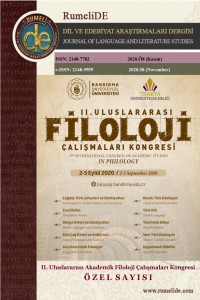Abstract
Diğer önemli olaylar gibi, yirminci yüzyıldaki iki dünya savaşı takip eden nesilleri derinden etkilemiş ve halihazırda yarattıkları evrenlerindeki durumlarını anlamak ve konumlandırmak için varlıklarını sorgulamaya, gerçek ve kurgu, tarih ve hikaye, doğruluk ve sahtelik konularında epistomolojik sorular sormaya itmiştir. Graham Swift’in ikinci romanı olan Shuttlecock savaş gazisi olan babasından miras kalan geçmişi devralan kıdemli bir polis arşivcisinin geçmişi tamamen kavrayabileceğini düşünerek olağan bir hayata kavuşma çabaları üzerine kuruludur. Şimdinin doğal olmayan gerçekliğini geçmişi kazarak yok edebileceğini düşünmektedir fakat geçmiş ahenkli bir hayata ulaşması için gerekli cevapları barındırmamaktadır. Nihayetinde, epistomolojik arayışını bırakır ve geçmişle şimdinin arasında içinde bulunduğu zamandaki gerçekliği kabul eder. Slavoj Žižek’in İdeolojinin Yüce Nesnesi adlı eleştirisinde belirttiği üzere modern yalnızlığı gözardı etmek tehlikeli bir fantezidir ve doğal bir dengeye kavuşmak imkansızdır. Bu makale, geçmişi kavramanın imkansızlığıyla uzlaşmak için bellek, travma ve modernite arasındaki bağı incelemektedir.
Keywords
References
- Assmann, Jan. (1997). Moses the Egyptian, Harvard University Press, Cambridge.
- Hume, David. (2000). A Treatise of Human Nature, ed. David Fate Norton and Mary J. Norton. Oxford: Oxford University Press.
- Hutcheon, Linda. (1988). A Poetics of Postmodernism: History, Theory, Fiction Routledge, London.
- Janik, Del Ivan. (1989). History and the "Here and Now": The Novels of Graham Swift, Twentieth Century Literature, Vol. 35, No. 1, 74-88. Hofstra University, http://www.jstor.org/stable/441776
- Kaczvinsky, Donald P. (1998) “For one thing, there are the gaps”: History in Graham Swift's Shuttlecock, Critique: Studies in Contemporary Fiction, 40:1, 3-14, DOI: 10.1080/00111619809601560
- Locke, John. (1997). An Essay Concerning Human Understanding, ed. Roger Woolhouse. London and New York: Penguin.
- Middleton, Peter and Woods, Tim. (2000). Literatures of Memory. Manchester: Manchester University Press.
- Nietzsche, Friedrich Wilhelm. (1997). ‘On the Uses and Disadvantages of History for Life’, in Daniel Breazale (ed.), Untimely Meditations, trans. R. J. Hollingdale, Cambridge: Cambridge University Press.
- Swift, Graham. (1981). Shuttlecock. New York: Poseidon.
- Yalçın, Gamze (2014). Grotesque Selfness of Traumatic Otherness in Martin Amis’ Novels Other People, Time’s Arrow, and Money. [Master’s Degree Thesis] Denizli: Pamukkale University, https://tez.yok.gov.tr/UlusalTezMerkezi/TezGoster?key=gyLHMouPes-CvnhRcjQsKaKZmGYGznmDowH5Ac8MxzIHiM1U_b_P4oXDfjxHVyQc
- Žižek,Slavoj. (1989). The Sublime Object of Ideology. London: Verso.
Abstract
Like the other influential events in world history, the two world wars of the twentieth century have deeply influenced the following generations and forced them to evaluate their existence and ask epistemological questions about fact and fiction, history and story, and truth and falsity in order to understand and situate themselves in a constructed present world. Shuttlecock, Graham Swift’s second novel, follows a senior police archivist who inherits a past from his veteran father and attempts to reach a natural flow of life by fully grasping the past. He thinks that he can dissolve the unnaturally constructed reality of the present by digging the past but scrutinizing the past does not provide the necessary answers to settle him down in harmony. In the end, he leaves his epistemological quest and seems to come to terms with the fragmented reality between the past and present. However, as Slavoj Žižek notes in The Sublime Object of Ideology, overseeing the modern alienation is a dangerous fantasy and it is impossible to return to a natural balance. This article aims to discuss the relationship between memory, trauma and modernity in order to come to terms with the impossibility of knowing the past.
Keywords
References
- Assmann, Jan. (1997). Moses the Egyptian, Harvard University Press, Cambridge.
- Hume, David. (2000). A Treatise of Human Nature, ed. David Fate Norton and Mary J. Norton. Oxford: Oxford University Press.
- Hutcheon, Linda. (1988). A Poetics of Postmodernism: History, Theory, Fiction Routledge, London.
- Janik, Del Ivan. (1989). History and the "Here and Now": The Novels of Graham Swift, Twentieth Century Literature, Vol. 35, No. 1, 74-88. Hofstra University, http://www.jstor.org/stable/441776
- Kaczvinsky, Donald P. (1998) “For one thing, there are the gaps”: History in Graham Swift's Shuttlecock, Critique: Studies in Contemporary Fiction, 40:1, 3-14, DOI: 10.1080/00111619809601560
- Locke, John. (1997). An Essay Concerning Human Understanding, ed. Roger Woolhouse. London and New York: Penguin.
- Middleton, Peter and Woods, Tim. (2000). Literatures of Memory. Manchester: Manchester University Press.
- Nietzsche, Friedrich Wilhelm. (1997). ‘On the Uses and Disadvantages of History for Life’, in Daniel Breazale (ed.), Untimely Meditations, trans. R. J. Hollingdale, Cambridge: Cambridge University Press.
- Swift, Graham. (1981). Shuttlecock. New York: Poseidon.
- Yalçın, Gamze (2014). Grotesque Selfness of Traumatic Otherness in Martin Amis’ Novels Other People, Time’s Arrow, and Money. [Master’s Degree Thesis] Denizli: Pamukkale University, https://tez.yok.gov.tr/UlusalTezMerkezi/TezGoster?key=gyLHMouPes-CvnhRcjQsKaKZmGYGznmDowH5Ac8MxzIHiM1U_b_P4oXDfjxHVyQc
- Žižek,Slavoj. (1989). The Sublime Object of Ideology. London: Verso.
Details
| Primary Language | English |
|---|---|
| Subjects | Linguistics |
| Journal Section | World languages, cultures and litertures |
| Authors | |
| Publication Date | November 21, 2020 |
| Published in Issue | Year 2020 Issue: Ö8 |


